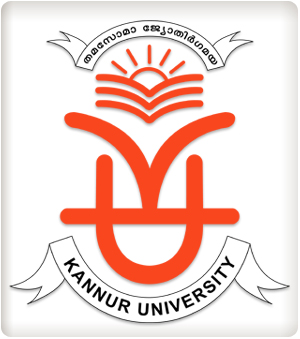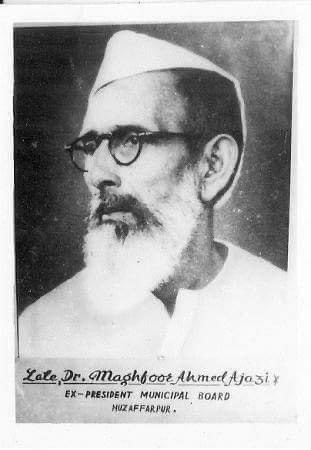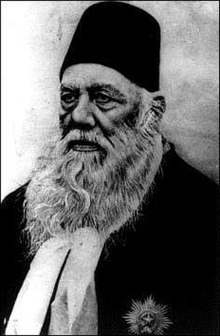
Sir Syed Ahmad Khan, also spelled Sayyid Ahmad Khan, was an Indian Muslim reformer, philosopher, and educationist in nineteenth-century British India. Though initially espousing Hindu–Muslim unity, he later became the pioneer of Muslim nationalism in India and is widely credited as the father of the two-nation theory, which formed the basis of the Pakistan movement. Born into a family with strong ties to the Mughal court, Ahmad studied science and the Quran within the court. He was awarded an honorary LLD from the University of Edinburgh in 1889.

Sir Syed University of Engineering and Technology is a private research university located in the urban area of Karachi, Sindh, Pakistan. The university is honored in the name of notable 19th-century Indian Muslim reformer and philosopher, Sir Syed Ahmad Khan.

Shibli Nomani was an Islamic scholar, poet, philosopher, historian, educational thinker, author, orator, reformer and critic of orientalists from Indian subcontinent during the British Raj. He is regarded as the father of Urdu historiography. He was also proficient in Arabic and Persian languages. Shibli was associated with two influential movements in the region, the Aligarh and the Nadwa movements. As a supporter of the Deobandi school, he believed that English language and European sciences should be incorporated into the education system. Shibli wrote several biographies of Muslim heroes, convinced that Muslims of his time could learn valuable lessons from the past. His synthesis of past and modern ideas contributed significantly to Islamic literature produced in Urdu between 1910 and 1935. Shibli established the Darul Musannefin Shibli Academy in 1914 to promote Islamic scholarship and also founded the Shibli National College in 1883. Although he collected much material on the life of Prophet Muhammad, he could only complete the first two volumes of the planned work, Sirat al-Nabi. His disciple, Sulaiman Nadvi, added to this material and wrote the remaining five volumes after Shibli's death.

Kannur University is a multi-campus public university established in 1996 to provide development of higher education in Kasaragod, Kannur, Wayanad districts of Kerala, India. It serves the region of North Malabar. It was established after the passing of Act No. 22 of 1996 of the Kerala Legislative Assembly. A university by the name of "Malabar University" had come into existence even earlier by the passing of an ordinance by the Governor of Kerala, on 9 November 1995.

New Karachi Town lies in the northern part of the city Gulberg Town. It was formed when katchi abadis were resettled following the 1958 coup d'état. In 2001 it was subdivided into 13 union councils. The town system was disbanded in 2011, and New Karachi Town was re-organized as part of Karachi Central District in 2015.

The Urdu movement was a socio-political movement aimed at making the Urdu standard of the Hindostani language as the universal lingua-franca and symbol of the cultural and political identity of the Muslim communities of the Indian subcontinent during the British Raj. The movement began with the fall of the Mughal Empire in the mid-19th century, fuelled by the Aligarh movement of Sir Syed Ahmed Khan. It strongly influenced the All India Muslim League and the Pakistan movement.

Beerwah also pronounced as Beeru is a subdistrict, tourist destination and one of the oldest towns of Jammu and Kashmir and a municipal committee in Budgam district in the Indian administered union territory of Jammu and Kashmir. It is also one of the oldest tehsils of Jammu and Kashmir with one of the largest towns in Budgam district. Beerwah is 27 km (17 mi) away from the summer capital Srinagar via Bemina, 31 km (19 mi) via Magam, 33 km (21 mi) via Soibugh and 35 km (22 mi) via Budgam. Beerwah subdistrict has 4 tehsils namely Beerwah, Magam, Narbal and Khag. Beerwah is located along the banks of River Sukhnaag.
The Sir Syed CASE Institute of Technology is a private university located in Islamabad, Pakistan.
Muhammad Ali Siddiqui was a noted scholar of Urdu literature, educationist, literary critic and a newspaper columnist from Pakistan. He was also widely known by his pen name Ariel in Pakistan.
Saddar, Rawalpindi, Pakistan, is the main commercial hub of Rawalpindi Cantonment. It is located between the Mall road and the main railway lines connecting Rawalpindi with down-country. It has some major business and commercial centres, main branches of major Pakistani banks, and residential areas of British colonial era. Saddar is a home to a dense cluster of residential and commercial buildings. Shops as well as shopping malls offer a diverse range of locally manufactured products and imported items. Chota Bazaar is a famous shopping area in northern Saddar.

Ibn Sina Academy of Medieval Medicine and Sciences (IAMMS) is a trust registered under the Indian Trusts Act, 1882. Mohammad Hamid Ansari, former vice-chancellor of Aligarh Muslim University, Aligarh, formally inaugurated it on 21 April 2001. Department of AYUSH, Ministry of Health and Family Welfare, Government of India gave accreditation to the academy in 2004 and promoted it as 'centre of excellence' in 2008. Membership of the academy is open to anyone who has an interest in the academy's activities particularly on history of medicine and history of science. Being a charitable organization, donations to the Academy are also exempted from Income Tax under section 80G of the Income Tax Act 1961.
The Aligarh Institute Gazette was the first multilingual journal of India, introduced, edited, and published in 1866 by Sir Syed Ahmed Khan which was read widely across the country. Theodore Beck later became its editor.
Tehzeeb-ul-Ikhlaq is a journal established by the Muslim reformer Sir Syed Ahmad Khan in 1871. The journal published alternative Muslim perspectives, written in plain language. It gave voice to the publisher's religious, social, and reforming opinions, and is credited with establishing him as one of the fathers of Urdu fiction. The same journal was restarted by Syed Hamid Vice-chancellor of Aligarh Muslim University in 1981; and since then it is being published regularly. There is now a separate office of Tehzeeb-ul-Ikhlaq.
Nagar College, established on 1998, is a general degree college of Nagar in Murshidabad district of West Bengal, India. It offers undergraduate courses in arts and science. It is affiliated with the university of Kalyani. Syed Abdur Razzaque founded the college. The late Syed Ali Zaker founded Nagar Aziza Memorial High School in memory of his deceased daughter, Aziza. As mentioned in the trust deed, executed by the late Syed Ali Zaker, his son, Syed Abdur Razzaque, the Secretary of Nagar Aziza Memorial High School, took initiative on the college. He visited more than 250 villages, gathering contributions. After the recognition of the college, Syed Abdur Razzaque became the first President of the Governing Body and his son Syed Rajiul Mahabub is the only donor member on the Governing Body.

Maghfoor Ahmad Ajazi was a political activist from Bihar, prominent in the Indian independence movement.

Aligarh Muslim University is a public central university in Aligarh, Uttar Pradesh, India, which was originally established by Sir Syed Ahmad Khan as the Muhammadan Anglo-Oriental College in 1875. Muhammadan Anglo-Oriental College became Aligarh Muslim University in 1921, following the Aligarh Muslim University Act. It has three off-campus centres in AMU Malappuram Campus (Kerala), AMU Murshidabad Centre, and Kishanganj Centre (Bihar).
The Aligarh Movement was the push to establish a modern system of Western-style scientific education for the Muslim population of British India, during the later decades of the 19th century. The movement's name derives from the fact that its core and origins lay in the city of Aligarh in Central India and, in particular, with the foundation of the Muhammadan Anglo-Oriental College in 1875. The founder of the oriental college, and the other educational institutions that developed from it, was Sir Syed Ahmed Khan. He became the leading light of the wider Aligarh Movement.
Sahibzada Aftab Ahmad Khan was an attorney and educator. He was a former vice chancellor of Aligarh Muslim University.
Muhammadan Anglo-Oriental College was founded in 1875 by Sir Syed Ahmad Khan, initially as a primary school, with the intention of turning it to a college level institution. It was inspired by the Cambridge education system. It started operations on Queen Victoria's 56th birthday, 24 May 1875.











